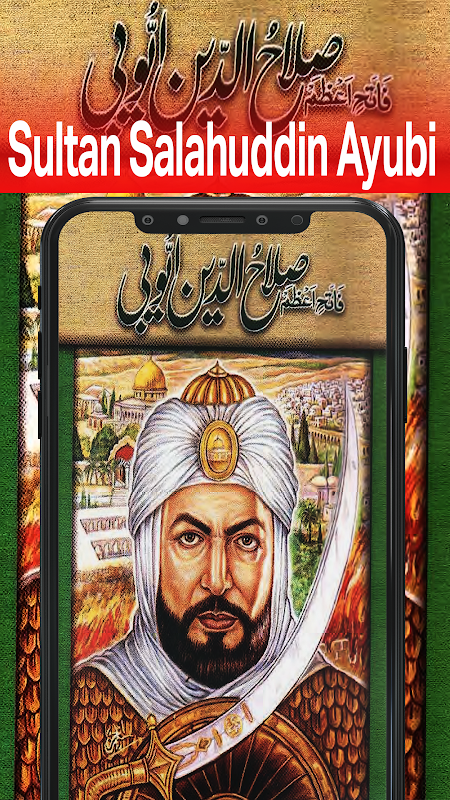Haolingxiazai provides the latest software downloads for Sultan Salahuddin Ayubi Urdu games.


Sultan Salahuddin Ayubi Urdu
| App Name | Sultan Salahuddin Ayubi Urdu |
|---|---|
| Genre | Education |
| Size | 42.5 MB |
| Latest Version | 1.0.3 |
| MOD Info | Premium Unlocked |
| Get it On |

|
Sultan Salahuddin Ayubi — The Great Warrior Of Islam
At the height of his power, his sultanate included Egypt, Syria, Upper Mesopotamia, the Hejaz, Yemen and other parts of North Africa.
This is the historical story of famous muslim commander Sultan Salahuddin Ayubi. He was a true muslim and a great conqueror.
An-Nasir Salah ad-Din Yusuf ibn Ayyub (Arabic: صلاح الدين يوسف بن أيوب / ALA-LC: Ṣalāḥ ad-Dīn Yūsuf ibn Ayyūb; Kurdish: سەلاحەدینی ئەییووبی / ALA-LC: Selahedînê Eyûbî), known as Salah ad-Din or Saladin (/ˈsælədɪn/; 1137 – 4 March 1193), was the first sultan of Egypt and Syria and the founder of the Ayyubid dynasty. A Sunni Muslim of Kurdish ethnicity. Saladin led the Muslim military campaign against the Crusader states in the Levant. During his reign, Saladin has been described as the de facto Caliph of Islam[8][9] and at the height of his power, his caliphate included Egypt, Syria, Upper Mesopotamia, the Hejaz, Yemen and other parts of North Africa.
He was originally sent to Fatimid Egypt in 1164 alongside his uncle Shirkuh, a general of the Zengid army, on the orders of their lord Nur ad-Din to help restore Shawar as vizier of the teenage Fatimid caliph al-Adid. A power struggle ensued between Shirkuh and Shawar after the latter was reinstated. Saladin, meanwhile, climbed the ranks of the Fatimid government by virtue of his military successes against Crusader assaults against its territory and his personal closeness to al-Adid. After Shawar was assassinated and Shirkuh died in 1169, al-Adid appointed Saladin vizier, a rare nomination of a Sunni Muslim to such an important position in the Isma'ili Shia caliphate. During his tenure as vizier, Saladin began to undermine the Fatimid establishment and, following al-Adid's death in 1171, he abolished the Fatimid Caliphate and realigned the country's allegiance with the Sunni, Baghdad-based Abbasid Caliphate.
In the following years, he led forays against the Crusaders in Palestine, commissioned the successful conquest of Yemen, and staved off pro-Fatimid rebellions in Upper Egypt. Not long after Nur ad-Din's death in 1174, Saladin launched his conquest of Syria, peacefully entering Damascus at the request of its governor. By mid-1175, Saladin had conquered Hama and Homs, inviting the animosity of other Zengid lords, the official rulers of Syria's various regions. Soon after, he defeated the Zengid army at the Battle of the Horns of Hama and was thereafter proclaimed the "Sultan of Egypt and Syria" by the Abbasid caliph al-Mustadi. Saladin made further conquests in northern Syria and Jazira, escaping two attempts on his life by Assassins, before returning to Egypt in 1177 to address issues there. By 1182, Saladin had completed the conquest of Muslim Syria after capturing Aleppo, but ultimately failed to take over the Zengid stronghold of Mosul.
Under Saladin's command, the Ayyubid army defeated the Crusaders at the decisive Battle of Hattin in 1187, and thereafter wrested control of Palestine—including the city of Jerusalem—from the Crusaders, who had conquered the area 88 years earlier. Although the Crusader Kingdom of Jerusalem continued to exist until the late 13th century, its defeat at Hattin marked a turning point in its conflict with the Muslim powers of the region. Saladin died in Damascus in 1193, having given away much of his personal wealth to his subjects. He is buried in a mausoleum adjacent to the Umayyad Mosque. Saladin has become a prominent figure in Muslim, Arab, Turkish and Kurdish culture, and he has often been described as being the most famous Kurd in history.
Keep share it and rate us.
Sultan Salahuddin Ayubi Urdu likely refers to a video game, potentially a strategy, role-playing, or action game, centered around the life and campaigns of Sultan Salahuddin Ayubi (Saladin), a prominent Muslim leader of the 12th century. The "Urdu" designation suggests the game's language or cultural focus is specifically tailored to an Urdu-speaking audience, indicating a strong emphasis on historical accuracy and cultural sensitivity relevant to that demographic.
The gameplay would likely revolve around managing Salahuddin's empire, building armies, engaging in diplomacy with neighboring kingdoms (both Muslim and Christian), and leading military campaigns against the Crusader states in the Levant. Players might need to manage resources, develop infrastructure, research new technologies (related to warfare or administration), and maintain the loyalty of their subjects. Key historical battles, such as the Battle of Hattin and the Siege of Jerusalem, would likely feature prominently. The game might also incorporate elements of character development, allowing players to improve Salahuddin's leadership skills, diplomatic abilities, or combat prowess. The Urdu language aspect would enrich the experience for Urdu speakers, offering authentic dialogues, historical narratives, and a deeper connection to the cultural context of the era. Ultimately, the game aims to immerse players in the world of Salahuddin Ayubi, allowing them to experience the challenges and triumphs of this iconic historical figure while promoting a greater understanding of his legacy within an Urdu-speaking cultural framework.











